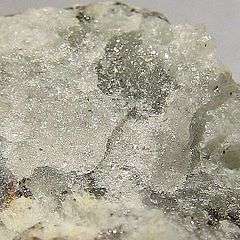Sanbornite
| Sanbornite | |
|---|---|
|
Sanbornite (white) with celsian (gray)—Incline, Maricopa County, California | |
| General | |
| Category | Phyllosilicate |
| Formula (repeating unit) | Ba(Si2O5) |
| Strunz classification | 9.EF.10 |
| Crystal system | Orthorhombic |
| Crystal class |
Dipyramidal (mmm) H-M symbol: (2/m 2/m 2/m) |
| Space group | Pmcn |
| Unit cell |
a = 4.62 Å, b = 7.68 Å c = 13.52 Å; Z = 4 |
| Identification | |
| Formula mass | 273.50 g/mol |
| Color | Colorless, White |
| Crystal habit | Platy modulated layers |
| Cleavage | Perfect |
| Mohs scale hardness | 5 |
| Luster | Vitreous |
| Streak | White |
| Diaphaneity | Transparent to translucent |
| Specific gravity | 3.74 |
| Optical properties | Biaxial (-) |
| Refractive index | nα = 1.597, nβ = 1.616, nγ = 1.624 |
| Birefringence | δ = 0.0270 |
| Dispersion | Weak |
| References | [1][2] |
Sanbornite is a rare barium phyllosilicate mineral with formula BaSi2O5. Sanbornite is a colorless to white to pale green, platey orthorhombic mineral with Mohs hardness of 5 and a specific gravity of 3.74.
It was first described from Incline, Mariposa County, California in 1932[3] and named for mineralogist Frank B. Sanborn (1862–1936).
See also
Footnotes
- ↑ Sanbornite: Sanbornite mineral information and data
- ↑ Sanbornite Mineral Data
- ↑ Rogers, A.F. (1932) Sanbornite, a new barium silicate mineral from Mariposa County, California. Amer. Mineral., 17, 161-172
References
This article is issued from Wikipedia - version of the 11/23/2016. The text is available under the Creative Commons Attribution/Share Alike but additional terms may apply for the media files.
